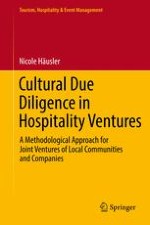2017 | OriginalPaper | Buchkapitel
4. Methodology: Identifying the Theoretical Framework of COCA
verfasst von : Nicole Häusler
Erschienen in: Cultural Due Diligence in Hospitality Ventures
Aktivieren Sie unsere intelligente Suche, um passende Fachinhalte oder Patente zu finden.
Wählen Sie Textabschnitte aus um mit Künstlicher Intelligenz passenden Patente zu finden. powered by
Markieren Sie Textabschnitte, um KI-gestützt weitere passende Inhalte zu finden. powered by
